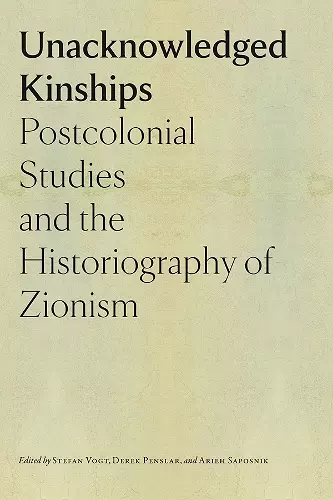Unacknowledged Kinships – Postcolonial Studies and the Historiography of Zionism
Stefan Vogt author Derek Penslar author Arieh Saposnik author
Format:Hardback
Publisher:Brandeis University Press
Published:24th Jul '23
£86.40 was £96.00
Supplier delay - available to order, but may take longer than usual.

This work explores the connections between postcolonial studies and Zionist historiography, examining theoretical concepts and their relevance to Zionism's history, while promoting dialogue between these two fields of study.
Unacknowledged Kinships – Postcolonial Studies and the Historiography of Zionism is a pioneering work that explores the relationship between postcolonial studies and the history of Zionism. The authors argue that there exists an unacknowledged kinship between these fields, which merits further exploration and recognition. By facilitating a dialogue between the historiography of Zionism and postcolonial studies, the book seeks to uncover potential connections and limitations between their respective subjects.
The contributors delve into key theoretical concepts from postcolonial studies, applying them to significant aspects of Zionist history. This analysis helps to contextualize Zionist thought, politics, and culture within broader colonial and postcolonial narratives. The book posits that postcolonial studies can benefit from examining Zionism not only as a form of colonial domination but also as a complex process of national liberation and self-empowerment. This dual perspective enriches the understanding of both fields and opens up new avenues for scholarly inquiry.
Ultimately, Unacknowledged Kinships stands out as the first comprehensive attempt to establish a dialogue between postcolonial studies and Zionist historiography. It emphasizes that postcolonial concepts can be applied to the history of European Zionism as effectively as they can to the experiences of Zionism in Palestine, Israel, and Arab countries. This work serves as an invitation for further discussion and collaboration between these two important areas of study, fostering a deeper understanding of their interconnected histories.
“This is a major volume attempting to create a rapprochement between postcolonial studies and the study of Zionism. The volume does what it sets out to do. It is the first serious attempt to rethink this relationship in both theoretical and concrete ways and is an enormously valuable first step in a mutual reassessment of contemporary theoretical approaches to Zionism. Given our present discussions about Zionism and anti-Semitism, a book that is of growing importance each and every day!” -- Sander Gilman, coauthor of Cosmopolitanisms and the Jews
“The history of the Jews and of Zionism have entertained a supremely ambivalent relationship with postcolonial studies. As Europeans’ most distinct and enduring ‘inner’ other, Jews were paradigmatic victims of colonialist practices and ideologies. Yet Zionism itself has often been accused of mirroring European colonialism. This immensely useful book brings much needed order to understand the tangled and ambivalent relationships between postcolonialism and the nationalist history of the Jews. More crucially, it shows that postcolonialism is a needed conceptual framework to further our understanding of the history and sociology of the Jews. This illuminating collection of texts will have a lasting impact on Israel and Jewish Studies.” -- Eva Illouz, Directrice d'Etudes, EHESS, Paris, and author of The Emotional Life of Populism
“Challenging the received wisdom that defines Zionism as a colonial enterprise, this volume breaks new ground in looking at its many if ultimately unsuccessful links with anticolonial movements worldwide. It represents, in addition, a welcome effort to lend depth and complexity to the history of nationalism more generally.” -- Faisal Devji, professor of Indian history, University of Oxford
“This volume brings together an unusually rich collection of theoretical interventions, historical case studies, and long-deferred conversations that interrogate the fraught relationship between Zionism and postcolonialism. The editors make a strong case for bringing into dialogue the two phenomena and the abundant scholarship they have generated. The result is a deeply engrossing, provocative, and often surprising reading experience that requires one to think anew about core assumptions.” -- David N. Myers, Distinguished Professor and Sady and Ludwig Kahn Chair in Jewish History, UCLA
ISBN: 9781684581559
Dimensions: unknown
Weight: unknown
360 pages